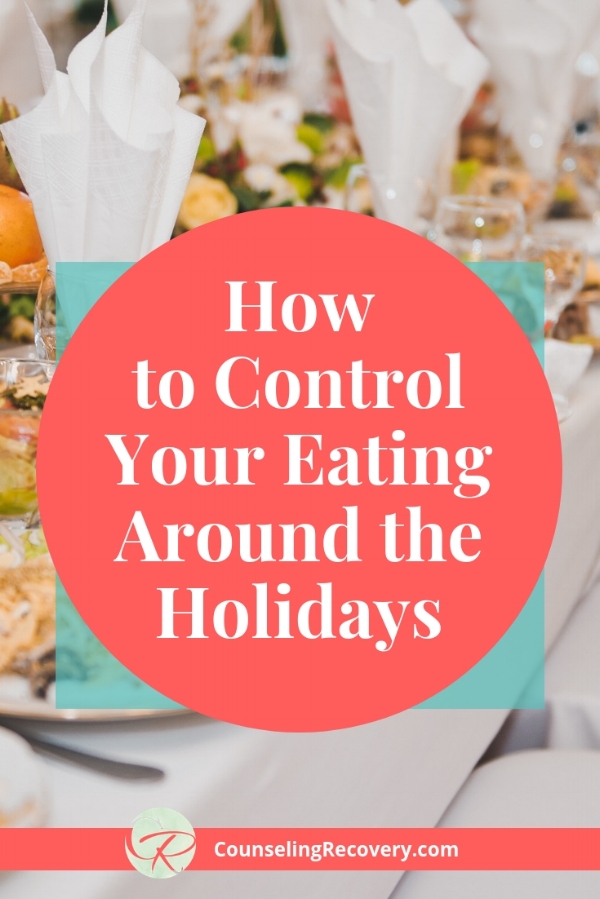How to Control Your Eating Around the Holidays
Wouldn't it be great to be able to enjoy the holidays without regretting what you ate?
The holidays are a challenging time if you struggle with food and weight. Every event seems to be centered around food. The pressure to eat the fatting stuff becomes a major challenge. The holidays are a time to celebrate but for the compulsive overeater, it starts a cycle of overeating that you can’t stop.
This blog provides help for how to deal with food around the holidays - plus where to go for additional help!
Food is Not a Solution
Around the holidays food and drink start all the fun. It's part of every family tradition and celebration. But when eating becomes compulsive, food means comfort, takes away difficult emotions, and in some cases numbs you from the pain of life.
Excess food is way to calm yourself in stressful situations. When it becomes habit, food becomes a way to cope or hide situations that you don't want to face.
Getting clear on what makes you overeat is the first step in the recovery process.
Reasons to Overeat
Painful memories this time of year causing you to numb out
Feelings of grief and loss
Not taking care of yourself so food becomes "your thing"
Hating your body or not wanting to be “in your body”
Alleviates the discomfort of socializing in groups
Unresolved family issues that get triggered
The American Psychological Association says that 39% of adults have overeaten or eaten unhealthy foods because of stress. Believe me you're not the only one!
Food relieves stress because it's warm and it's soothing. There may be happy memories around eating sugary or starchy foods from childhood. Some of us were rewarded or kept quiet with food.
A Secret Life
Using excess food often leads to physical and emotional isolation. It's tough to enjoy the holidays when you're binging. Overeating makes being in the moment impossible because you are obsessed about your food or weight.
Then you blame yourself - "I can't believe I did this again! I should be able to control this!”
These thoughts spiral into shame, secrecy and self-hate. Feeling fat makes socializing difficult because you hate how you look. It’s painful reminder of that holiday dress you can't fit into anymore.
That’s no way to enjoy the holidays.
How to Start Healing from Compulsive Eating
You can have a happier, more peaceful holiday without excess food. Admitting your powerlessness over food is the first step in food addiction recovery.
Here are some initial questions to increase awareness around food behaviors.
Do you use food to calm yourself?
Are there events that make you want to numb out with food?
Does feeling full distract you from living your life?
Once you start eating certain foods do you notice you can't stop?
Are you so obsessed with food, weight or appearance that you can’t relax?
If food is a problem, you are not alone.
In childhood, food is often the first substance that’s readily available for kids. Family members may model eating compulsively too. These addictive patterns are encouraged (unknowingly) when you're forced to "clean your plate" or stuff feelings that family doesn't want to hear about.
You may think that eating isn’t a problem because your weight is normal. Compulsive eating is not about the food or weight but an inability to handle life and deal with feelings. Having the skills to cope with life is part of the recovery process. Click here to learn more about food addiction support.
Handling the Stress instead of Excess Food
One part of food recovery is learning to handle stress. Stopping a compulsive behavior is tough but replacing it with healthier options gives your brain another focus. Here are a few suggestions.
Keep a journal to write out stressful feelings.
Get regular exercise to increase endorphins.
Find support with your eating or stress.
Practice mediation or EFT tapping - to get centered.
Keep your commitments reasonable to avoid overwhelm.
Join a support group like Overeaters Anonymous for additional help.
Tips for Healthy Eating Habits
Before the holidays, it’s helpful to make a plan. Think about all the events coming up and what will likely trigger you to want to use excess food.
Plan ahead what you'll eat.
Offer to bring healthy dishes to events.
Eat lighter and exercise on party days.
Don't go to a party hungry.
Find a buddy to text for mutual support.
Bring a healthy treat with you to avoid feeling deprived.
Try podcasts like Overeaters Anonymous Speak List.
Ask what's on the menu and plan accordingly.
Keep a food journal to track progress.
Finding the Right Support
Diets works if you work them. Unfortunately our culture has a "willpower mentality" when it comes to food issues. As if just stopping alone will fix it but it rarely does.
There are reasons you use food and once you deal with those directly and get the right support, your eating habits can change and you can begin to recover.
But if you find that you can't stick to a diet, think about getting additional support. I highly recommend Overeaters Anonymous. It's a free support group. There are no requirements and they have sponsors to guide you through the process. For more about 12 step programs read here Busting the Myths Around 12 Steps Programs.
I’ve created a private resource library including 20 Ways to Detach When You Need A Break and 15 Steps to Setting Healthy Boundaries plus lots more! Click the button below to sign up!



